(Huntsville, Ala. | February 4, 2020) – CFD Research announced today the award of a $1M grant from the National Institutes of Health (NIH) and the U.S. Food and Drug Administration (FDA) to further develop their multiscale simulation toolkit for computational pharmacology of trans/intradermally administered compounds (CPDAC). The physiologically inspired simulation toolkit predicts the clinical pharmacokinetic response and therapeutic effect of dermally administered compounds to optimize dosage, formulation and administration scenarios to complement and accelerate drug development, clinical investigations and regulatory evaluation.
“Delivery of therapeutic drugs via the dermal route is a promising alternative to oral or parenteral delivery routes because dermal drug delivery systems offer unique advantages such as controlled drug release over sustained periods for steady absorption into the systemic circulation, significant reduction in first-pass effects and gastrointestinal irritation, reduced dosing frequency and systemic toxicity, and better patient compliance,” said Dr. Mahadevabharath R. Somayaji, Manager at CFD Research computational biology and medicine division and Principal Investigator for this project.
 CFD Research has assembled a team of collaborators from Rutgers, Mercer University, NJIT, University of Mississippi, University of Michigan, UCSF and the University of Cincinnati. During Phase I, the team has developed a computational model of healthy skin and linked it with a systems pharmacology model and predicted the dermal absorption and clinical pharmacokinetics of first generation (Gen-1) transdermal systems (patches, creams, gels and ointments), and validated those results with clinical data.
CFD Research has assembled a team of collaborators from Rutgers, Mercer University, NJIT, University of Mississippi, University of Michigan, UCSF and the University of Cincinnati. During Phase I, the team has developed a computational model of healthy skin and linked it with a systems pharmacology model and predicted the dermal absorption and clinical pharmacokinetics of first generation (Gen-1) transdermal systems (patches, creams, gels and ointments), and validated those results with clinical data.
In this new project (Phase II), the team will work to augment the capabilities of CPDAC by including additional Gen-1 transdermal systems and for the first time include field-assisted iontophoresis (Gen-2) and microneedle-based intradermal (Gen-3) drug delivery systems. The resulting ‘holistic trans/intradermal model’ will be linked to an advanced in vitro to in vivo correlation (IVIVC)-linked whole-body physiologically based pharmacokinetics model (PBPK) for predicting the local and systemic pharmacokinetics of drugs, generics and cosmeceuticals delivered from Gen-1/2/3 systems, in healthy and diseased skin population (e.g., psoriasis, eczema, acne and keratosis).
“This project will provide opportunities to dive deep into the area of dermal drug delivery and will augment the scope of our computational pharmacology models/toolkit for pharma and other related applications,” commented Dr. Somayaji. “The goal is to deliver a robust, predictive and commercial quality CPDAC toolkit for pharma, FDA and therapeutic product developers.”
About CFD Research: Since its inception in 1987, CFD Research has worked with government agencies, businesses and academia to provide innovative solutions within the Aerospace & Defense, Biomedical & Life Sciences, and Energy & Materials industries. Over the years CFD Research has earned multiple national awards for successful application and commercialization of innovative component/system technology prototypes, multi-physics simulation software, multi-disciplinary analyses, and expert support services. CFD Research is an ISO9001 and AS9100 registered company and is appraised at CMMI Level II for services. Learn more at www.cfdrc.com.






